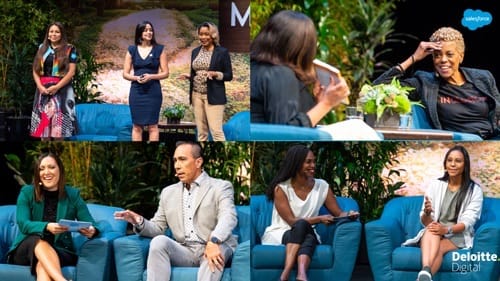Why Representation Matters: 7 Lessons From Our Racial Equality Summit



Salesforce hosted our second-annual Racial Equality Summit Representation Matters to inspire, empower, and elevate our most underrepresented communities in Tech — Black, Latinx, and Native — and see themselves reflected as Trailblazers on stage. Here are 7 memorable lessons from the event.
Representation matters. What we see around us — whether it’s in media, on stage, or in the boardroom — shapes how we see the world and can impact what we believe is possible for ourselves.
At Salesforce, we believe that businesses can be a powerful platform for social change. In that spirit, we hosted our second-annual Racial Equality Summit — Representation Matters — on September 24 in San Francisco. The event seeks to inspire, empower, and elevate our most underrepresented communities in Tech — Black, Latinx, and Indigenous — by featuring luminary Trailblazers from these communities. We want the future leaders of color in the audience to see themselves reflected back and the allies listening to learn more about their lived experience as well as how to help drive racial equality in their teams, businesses, and every day lives.
The full-day event, sponsored by Deloitte, featured executive speakers of color from companies like Google, Cisco, Lyft, Intel, Golden State Warriors, PepUp Tech, and more. We were honored to host keynotes by award-winning actress and activist Dascha Polanco of Orange is the New Black and When They See Us; filmmaker Ryan Coogler who directed Black Panther and Fruitvale Station; and writer, producer, actress Issa Rae who created Insecure.
The event, which had over 600 in-person attendees and over half a million online viewers, was kicked off by three of our Employee Resource Group (ERG) presidents. Monica Bowie, president of BOLDforce for our Black employees and allies; Andrea Schiller, president of Latinoforce for our Latinx employees and allies; and Jessica Heavy Runner, president of WINDforce for our Indigenous employees and allies.

In case you missed the event, here are notable lessons these luminaries shared:
1. Why ‘being unapologetically you’ matters

why Representation Matters to her personally, within the media industry and society at large
“It’s okay to ask for what you’re worth. I don’t understand why I have to be embarrassed to ask for more pay, because I know they need me,” award-winning actress and activist, Dascha Polanco said about the importance of equal pay for equal work.
And in case you needed to be reminded that she’s fearlessly business-minded. “Being an actress in Hollywood doesn’t distinguish me from being a business owner. I am a business . . .”
“We tend to always shape women and accept what it is to interpret women in just one single way as if we’re all that way . . . We see the same people playing superheroes and they cast someone else, and it’s the same type of person. I’m like ‘Hello!’ I can run, I can squat 215, I can pretend that I can’t see and use my hands, I can do it!” she said as the audience erupted in laughter and cheers.
Click here to watch the full session.
2. Why ‘being kingdom-minded’ matters

Chief Strategy Officer of Promise talk onstage during the “Leading the Change in
Business and Society” session
“As I grew and excelled in my career, I wanted to make sure that the opportunities that I had were also available to the people coming behind me. We rise by lifting others,” said Shonnah Hughes, Co-Founder of PepUp Tech.
“I love it when I’m in a space and I hear us refer to ourselves as kings and queens. It just fills me up. Equally, as we are kings and queens, we must be kingdom-minded. We have to think about that as we move through this world — whatever industry we’re in, no matter what space, or what position we’re in, big or small — think about how you can be Kingdom-minded. Think every single day about the business of the kingdom because what good is a king or a queen if the people in the kingdom are languishing,” said Jotaka L. Eaddy, Chief Strategy Officer of Promise.
Click here to watch the full session.
3. Why ‘being comfortable with being uncomfortable’ matters

during the “Moving Diversity Forward” keynote session
“I noticed there was a paralysis around engagement and bridging the divide because folks were constantly afraid they were going to say the wrong thing. A lot of us either hear things being said to us that’s not good, or we say something and all of a sudden, the whole room freezes. But you don’t know why it’s wrong, it just has an impact,” said Vern? Myers, VP Inclusion Strategy, Netflix.
Myers is a business leader in the Diversity and Inclusion space and coined the phrase: “Diversity is being invited to the party. Inclusion is being asked to dance.” To make sure you’re both getting invited to the party and asked to dance, Myers emphasized the importance of expanding your network. “When you are used to being around your identity, whatever that is, there is usually going to be some discomfort as you try to get comfortable. People don’t realize, they somehow think you can get comfortable without being uncomfortable. You have to first be uncomfortable and do it enough until ultimately you know it’s ok.”
4. Why sponsorship matters

and Guillermo Diaz, Jr, SVP, Customer Transformation at Cisco Systems, Inc.
talk onstage during the “Leading in the Tech Industry” session
“It’s important to understand the difference between the mentor and the sponsor. The mentor is going to talk with you, but the sponsor is going to talk about you. The sponsor is somebody that’s willing to put their badge on the table to say ‘she should be promoted,’” said Guillermo Diaz, Jr., SVP, Customer Transformation at Cisco Systems, Inc.
Sandra Lopez, VP Intel Capital and General Manager Intel Sports, knows the importance of active mentor relationships and allocates time on her schedule to help mentees. “I have monthly mentor days and I allocate this time to give back. My job is to be a resource and toolbox to help others get their next role. Mentors give you inspiration but sponsors give you the platform.”
One of the most poignant exchanges of the day was between Guillermo Diaz and Larry Quinlan, Chief Information Officer Deloitte. Diaz thanked Quinlan for flying across the country, years earlier, to support him in his promotion to SVP at Cisco. In this exchange, the audience could see how mentor and sponsor relationships truly benefit both parties.
Quinlan then went on to explain: “This is a people game. Be the kind of person that people want to help. As I look through my career, I look at every time I reached a pivotal point in my career and I made the right decision that got me somewhere else, I can point to the person who helped me. I can sometimes point to the person who helped me when I wasn’t smart enough to ask for that help and they still invested in me.” As a true Trailblazer, Quinlan continued in this vein, “In return, what can I do to ensure that I’m helping as many people as I possibly can?”
5. Why ‘opening the door for others’ matters

talk onstage during the Representation Matters keynote
“The more there is of us out there, the better it is for everybody,” said writer, producer and actress Issa Rae. “We are often told we don’t have enough experience, but we won’t have the experience if we aren’t given the opportunity…there just shouldn’t be an excuse…it’s so important to let people grow in this industry (both Hollywood and Tech) so that they can promote others.”
6. Why ‘knowing your history’ matters
“I knew I had a theme that I felt very passionate about the idea of what it means to be African. Specifically what it means to be an African person born on this continent and how that relates to the African experience abroad whether you are born on the continent or another location in the diaspora and what the relationship was with colonization. It’s probably a concept that everyone here has to continue with. It lit a fire in everyone and it was something that if we did it right, then we could share it with the audience and I think we did it,” said filmmaker Ryan Coogler.
7. Why representation matters

Corporate Counsel at Google talk onstage during the “Community Impact” session
“Still to this day, I may be the only woman in the room, the only Person of Color in the room. I had the same experience where at times it feels like a burden. But at this point, it’s now become a privilege. Because there aren’t a lot of people out there that look like me or have had the same experiences that I do, and so I find it a privilege to go out there and face that adversity so it’s not as difficult for the next person that comes in and looks like me,” said Maria Running Fisher-Jones, Corporate Counsel at Google.
As Dascha Polanco said on being a part of the award-winning TV series Orange is the New Black — “Being a part of a cast where I saw diversity from the crew to the cast…it’s so empowering. When you see yourself … your people … this (looking at the audience) it is magical."
Watch videos of the event:
There is still work to be done on this path toward Equality, using our platform for these important discussions is only one stop along this path. At Salesforce, we are committed to this journey via our various programs, our Employee Resource Groups and by practicing allyship. Learn more at Salesforce.com/Equality.

























